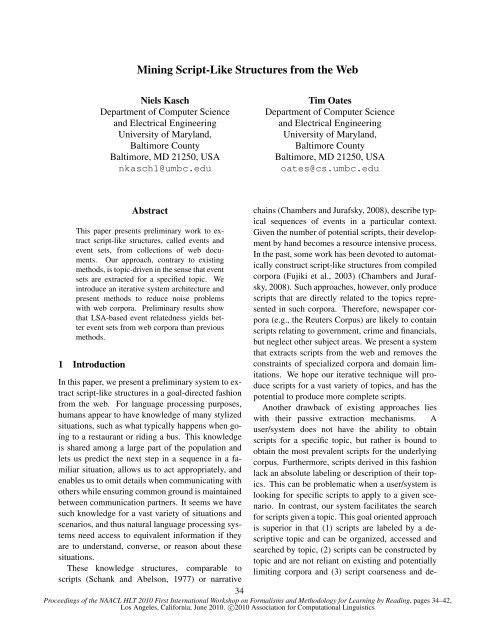W10-09
W10-09
W10-09
Create successful ePaper yourself
Turn your PDF publications into a flip-book with our unique Google optimized e-Paper software.
Mining Script-Like Structures from the Web<br />
Niels Kasch<br />
Department of Computer Science<br />
and Electrical Engineering<br />
University of Maryland,<br />
Baltimore County<br />
Baltimore, MD 21250, USA<br />
nkasch1@umbc.edu<br />
Abstract<br />
This paper presents preliminary work to extract<br />
script-like structures, called events and<br />
event sets, from collections of web documents.<br />
Our approach, contrary to existing<br />
methods, is topic-driven in the sense that event<br />
sets are extracted for a specified topic. We<br />
introduce an iterative system architecture and<br />
present methods to reduce noise problems<br />
with web corpora. Preliminary results show<br />
that LSA-based event relatedness yields better<br />
event sets from web corpora than previous<br />
methods.<br />
1 Introduction<br />
In this paper, we present a preliminary system to extract<br />
script-like structures in a goal-directed fashion<br />
from the web. For language processing purposes,<br />
humans appear to have knowledge of many stylized<br />
situations, such as what typically happens when going<br />
to a restaurant or riding a bus. This knowledge<br />
is shared among a large part of the population and<br />
lets us predict the next step in a sequence in a familiar<br />
situation, allows us to act appropriately, and<br />
enables us to omit details when communicating with<br />
others while ensuring common ground is maintained<br />
between communication partners. It seems we have<br />
such knowledge for a vast variety of situations and<br />
scenarios, and thus natural language processing systems<br />
need access to equivalent information if they<br />
are to understand, converse, or reason about these<br />
situations.<br />
These knowledge structures, comparable to<br />
scripts (Schank and Abelson, 1977) or narrative<br />
Tim Oates<br />
Department of Computer Science<br />
and Electrical Engineering<br />
University of Maryland,<br />
Baltimore County<br />
Baltimore, MD 21250, USA<br />
oates@cs.umbc.edu<br />
chains (Chambers and Jurafsky, 2008), describe typical<br />
sequences of events in a particular context.<br />
Given the number of potential scripts, their development<br />
by hand becomes a resource intensive process.<br />
In the past, some work has been devoted to automatically<br />
construct script-like structures from compiled<br />
corpora (Fujiki et al., 2003) (Chambers and Jurafsky,<br />
2008). Such approaches, however, only produce<br />
scripts that are directly related to the topics represented<br />
in such corpora. Therefore, newspaper corpora<br />
(e.g., the Reuters Corpus) are likely to contain<br />
scripts relating to government, crime and financials,<br />
but neglect other subject areas. We present a system<br />
that extracts scripts from the web and removes the<br />
constraints of specialized corpora and domain limitations.<br />
We hope our iterative technique will produce<br />
scripts for a vast variety of topics, and has the<br />
potential to produce more complete scripts.<br />
Another drawback of existing approaches lies<br />
with their passive extraction mechanisms. A<br />
user/system does not have the ability to obtain<br />
scripts for a specific topic, but rather is bound to<br />
obtain the most prevalent scripts for the underlying<br />
corpus. Furthermore, scripts derived in this fashion<br />
lack an absolute labeling or description of their topics.<br />
This can be problematic when a user/system is<br />
looking for specific scripts to apply to a given scenario.<br />
In contrast, our system facilitates the search<br />
for scripts given a topic. This goal oriented approach<br />
is superior in that (1) scripts are labeled by a descriptive<br />
topic and can be organized, accessed and<br />
searched by topic, (2) scripts can be constructed by<br />
topic and are not reliant on existing and potentially<br />
limiting corpora and (3) script coarseness and de-<br />
34<br />
Proceedings of the NAACL HLT 2010 First International Workshop on Formalisms and Methodology for Learning by Reading, pages 34–42,<br />
Los Angeles, California, June 2010. c○2010 Association for Computational Linguistics


